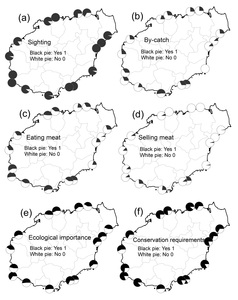Liu, M;
Lin, M;
Turvey, ST;
Li, S;
(2019)
Fishers' experience and perceptions of marine mammals in the South China Sea: insights for improving community-based conservation.
Aquatic Conservation: Marine and Freshwater Ecosystems
, 29
(5)
pp. 809-819.
10.1002/aqc.3073.

Preview |
Text
Turvey_AQC-18-0345_R1.pdf - Accepted Version Download (708kB) | Preview |
![[thumbnail of figure1_re.jpg]](https://discovery-pp.ucl.ac.uk/10066167/3.hassmallThumbnailVersion/figure1_re.jpg)  Preview |
Image
figure1_re.jpg - Accepted Version Download (1MB) | Preview |
![[thumbnail of figure2.jpg]](https://discovery-pp.ucl.ac.uk/10066167/8.hassmallThumbnailVersion/figure2.jpg)  Preview |
Image
figure2.jpg - Accepted Version Download (3MB) | Preview |
![[thumbnail of figure3_re.jpg]](https://discovery-pp.ucl.ac.uk/10066167/13.hassmallThumbnailVersion/figure3_re.jpg)  Preview |
Image
figure3_re.jpg - Accepted Version Download (2MB) | Preview |
![[thumbnail of figure4.jpg]](https://discovery-pp.ucl.ac.uk/10066167/18.hassmallThumbnailVersion/figure4.jpg)  Preview |
Image
figure4.jpg - Accepted Version Download (1MB) | Preview |
![[thumbnail of figure5.jpg]](https://discovery-pp.ucl.ac.uk/10066167/23.hassmallThumbnailVersion/figure5.jpg)  Preview |
Image
figure5.jpg - Accepted Version Download (759kB) | Preview |
Preview |
Text
Supplementary TextS1.pdf - Accepted Version Download (873kB) | Preview |
Preview |
Text
Turvey_Supplementary FigureS1.pdf - Accepted Version Download (334kB) | Preview |
Preview |
Text
Turvey_Supplementary TableS1.pdf - Accepted Version Download (262kB) | Preview |
Abstract
1.Successful conservation of marine mammals is often dependent upon support from local fishing communities, and valuable conservation insights can be obtained through understanding fishers’ attitudes and awareness of marine mammals. 2. A new local ecological knowledge dataset was obtained through large-scale questionnaire-based interviews with 510 artisanal fishers from 16 coastal fishing communities around Hainan, China. Almost all respondents (92.7%) reported regular encounters with marine mammals. Many respondents reported negative interactions with marine mammals, including by-catch (25.5%), consumption (36.1%), and sale of meat (9.2%), and respondent perceptions of marine mammals were often negative. 3. Generalized linear models (GLMs) indicated that respondent experience of marine mammal encounters and by-catch events was mainly predicted by indices of fishing effort and experience rather than by geographic or socio-economic factors. Respondent experience of eating or selling marine mammal meat was predicted by geographic location and by some livelihood and socio-economic factors. Respondent perceptions of marine mammals were instead predicted by fishing experience and education level. 4. Classification and regression trees (CARTs) showed that the most important factors determining respondent experience and perceptions were number of fishing years and educational level, respectively. Both GLMs and CARTs 3 indicated the complex effects of geographic, livelihood and socio-economic factors on respondent experience and perceptions of marine mammals. 5. Regional community-based conservation of marine mammals could be promoted through improved regulatory management and environmental education, sustainable ecological exploitation and economic development, and positive partnerships and collaboration between fishing communities, enforcement agencies and researchers.
| Type: | Article |
|---|---|
| Title: | Fishers' experience and perceptions of marine mammals in the South China Sea: insights for improving community-based conservation |
| Open access status: | An open access version is available from UCL Discovery |
| DOI: | 10.1002/aqc.3073 |
| Publisher version: | https://doi.org/10.1002/aqc.3073 |
| Language: | English |
| Additional information: | This version is the author accepted manuscript. For information on re-use, please refer to the publisher’s terms and conditions. |
| Keywords: | Marine fisheries, fishing communities, artisanal fishers, local ecological knowledge, interview survey, marine mammal conservation |
| UCL classification: | UCL UCL > Provost and Vice Provost Offices UCL > Provost and Vice Provost Offices > School of Life and Medical Sciences UCL > Provost and Vice Provost Offices > School of Life and Medical Sciences > Faculty of Life Sciences UCL > Provost and Vice Provost Offices > School of Life and Medical Sciences > Faculty of Life Sciences > Div of Biosciences |
| URI: | https://discovery-pp.ucl.ac.uk/id/eprint/10066167 |
Archive Staff Only
 |
View Item |


